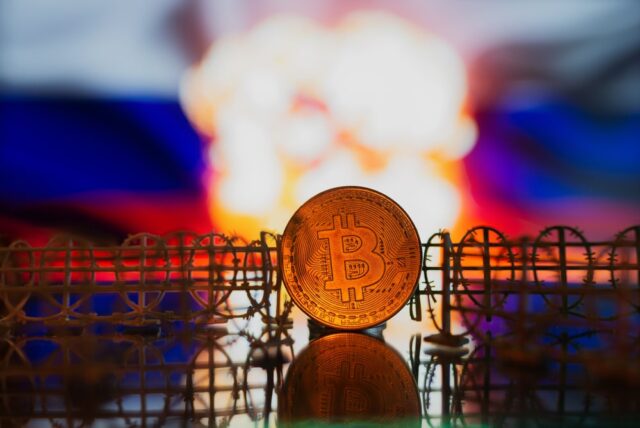With stringent international sanctions disrupting traditional financial systems, Russia is turning to cryptocurrencies as a lifeline for its global trade. The recent legislation passed by the State Duma legalizes Bitcoin mining and using stablecoins for cross-border payments, marking a significant policy reversal. This legislative move underscores the Kremlin’s determination to circumvent economic isolation and ensure the continuity of its export-import activities through innovative digital solutions.
In this historic shift driven by geopolitical and economic pressures, Russia has enacted legislation that legalizes the mining of Bitcoin and permits the use of cryptocurrencies, including stablecoins, for international trade. It’s a direct response to the extensive economic sanctions imposed by Western nations following Russia’s invasion of Ukraine. These sanctions have significantly hampered Russia’s ability to engage in international transactions through conventional financial systems such as SWIFT.
Legislative and Regulatory Changes
The upcoming legislation is set to take effect on September 1, 2024. It marks a notable deviation from Russia’s past approach to cryptocurrencies. Traditionally, the Russian government and its central bank have been hesitant about embracing digital currencies, mainly to protect the ruble and prevent financial instability. However, the economic landscape changed dramatically under the weight of international sanctions. This prompted a reassessment of the potential benefits of blockchain technology.
The bill passed with an overwhelming majority by the State Duma allows the mining of Bitcoin and permits using cryptocurrencies for international trade settlements. This legal framework aims to provide an alternative to traditional financial channels blocked or heavily regulated due to sanctions. By leveraging digital currencies, Russia hopes to maintain trade relations with key partners such as China, India, and Turkey. These countries may be more open to transacting in cryptocurrencies.
Economic and Strategic Implications
The Kremlin’s move to legalize cryptocurrency mining and crypto payments must be viewed as a strategic effort to mitigate the impact of sanctions and stabilize Russia’s economy. Cryptocurrencies, particularly stablecoins, provide a relatively stable and secure way to conduct international transactions without depending on the US dollar or the Euro. This is crucial for Russia, whose access to these currencies has been restricted by the sanctions.
Furthermore, integrating digital currencies into Russia’s financial system is expected to enhance the efficiency and security of cross-border transactions. Stablecoins are viewed as a viable solution for international payments due to their relatively stable value compared to more volatile cryptocurrencies like Bitcoin. This could facilitate smoother trade operations and provide a buffer against the economic disruptions caused by sanctions.
International Reactions and Compliance
While Russia’s legislative changes are poised to reshape its economic interactions, they raise concerns about regulatory compliance and the potential for sanctions evasion. The United States and the European Union have been vigilant in monitoring the use of cryptocurrencies. They want to ensure they do not become tools for circumventing sanctions. These international bodies have called on major cryptocurrency exchanges to enforce strict measures to prevent sanctioned entities from using their platforms for illicit activities.
>>> Read More: Lithuania Fines Payeer €9.3M for Russia Sanctions Breach
Russia’s recent decision to legalize Bitcoin mining and cryptocurrency payments for international trade is a significant development. As the country grapples with challenges posed by international sanctions, it is turning to blockchain technology to support its economic activities and uphold trade relationships. The government’s mandate underscores the transformative power of digital currencies. It also highlights the ongoing struggle between regulatory compliance and financial innovation amidst geopolitical conflicts.
By adopting cryptocurrencies, Russia is charting a new course in its economic strategy. It could have far-reaching implications for global trade and the future of digital finance. As this situation evolves, the world will be closely watching the impact of Russia’s bold legislative changes on its domestic economy and its position in the international arena.
Readers’ frequently asked questions
How will Russia’s move to legalize cryptocurrencies affect its relations with Western countries?
Russia’s decision to legalize cryptocurrencies for international trade is likely to further strain its relations with Western countries. These nations perceive it as a direct attempt to circumvent the economic sanctions imposed by them. It could prompt additional regulatory measures or sanctions aimed specifically at curbing the use of digital currencies by Russian entities. Western countries, particularly the United States and the European Union, have been closely monitoring the use of cryptocurrencies. They want to ensure they are not used to evade sanctions. This heightened scrutiny could lead to more pressure on global cryptocurrency exchanges to enforce stringent compliance measures, potentially limiting Russia’s ability to utilize these digital assets internationally.
What are the potential risks and challenges associated with Russia’s adoption of cryptocurrencies for international trade?
While adopting cryptocurrencies opens a path for Russia to bypass traditional financial restrictions, it also introduces some risks and challenges. One significant risk is the volatility of cryptocurrencies like Bitcoin. This can result in unpredictable transaction values and financial instability. Additionally, the global regulatory environment for cryptocurrencies is still evolving. There is a risk that international bodies could implement more stringent regulations to prevent their misuse, further complicating Russia’s use of these assets. There are also technical and security concerns, such as the potential for cyberattacks and the need for robust infrastructure to support secure transactions. Furthermore, integrating cryptocurrencies into the financial system may face resistance from domestic institutions wary of undermining the ruble’s stability.
How might this legislative change impact the global cryptocurrency market?
Russia’s entry into the cryptocurrency market on such a significant scale could have multiple impacts. On one hand, it could drive up demand for cryptocurrencies, potentially increasing their value and fostering greater adoption and innovation in the blockchain space. On the other hand, it could lead to increased regulatory scrutiny globally. Other countries seek to prevent the use of cryptocurrencies to evade sanctions. This heightened scrutiny might result in stricter compliance requirements for cryptocurrency exchanges and possibly even restrictions on certain transactions. That could affect liquidity and market dynamics. Additionally, the increased usage of cryptocurrencies by a major economy like Russia might accelerate the development of international regulatory frameworks and cooperation aimed at overseeing the global cryptocurrency market.
What Is In It For You? Action Items You Might Want to Consider
Diversify Your Portfolio with Stablecoins and Bitcoin
Given Russia recently legalized Bitcoin mining and the use of stablecoins for international trade, traders should consider diversifying their portfolios to include these digital assets. The increased demand from a major economy like Russia could drive up the value and stability of these cryptocurrencies. Stablecoins, in particular, are designed to maintain a stable value. They can offer a safer hedge against the volatility typically associated with cryptocurrencies. Investing in both, Bitcoin and stablecoins, you can balance the potential for high returns with the security of more stable assets.
Stay Informed on Regulatory Changes
The international regulatory landscape for cryptocurrencies is likely to evolve rapidly in response to Russia’s actions. Traders should stay updated on regulatory developments in major economies and across global markets. This includes monitoring announcements from the United States, the European Union, and other significant financial regulators. They may implement stricter measures to prevent using cryptocurrencies for sanctions evasion. Keeping abreast of these changes will help you navigate compliance issues and adjust your trading strategies accordingly to mitigate risks.
Leverage Volatility for Strategic Trades
The geopolitical impact of Russia’s move could introduce significant volatility into the cryptocurrency markets. Traders can capitalize on this by employing strategies that benefit from price swings. Techniques such as swing trading, which involves capturing gains by holding an asset for a short period, or using options to hedge against potential downturns, can be effective. Additionally, keep a close eye on market sentiment and news related to Russia’s cryptocurrency activities. It can provide insights into price movements, allowing for more informed and strategic trading decisions.











[…] 2024, the tone had changed. In August, President Putin signed a law legalizing crypto mining. Registered companies could mine. Individuals could mine without registration if their energy use […]